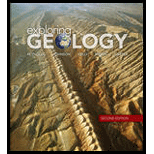Sorry! We don’t have solutions for this edition yet.
Solutions are available for other editions of this book
View 4th Edition solutionsarrow_forwardView 5th Edition solutionsarrow_forwardBook Details
Exploring Geology by Reynolds/Johnson/Kelly/Morin/Carter is a new, innovative textbook intended for an introductory college geology course, such as Physical Geology. This ground-breaking, visually spectacular book was designed from cognitive and educational research on how students think, learn, and study.
Nearly all information in the book is built around nearly 2,700 photographs and stunning illustrations, rather than being in long blocks of text that are not articulated with figures. These annotated illustrations help students visualize geologic processes and concepts, and are suited to the way most instructors already teach. To alleviate cognitive load and help students focus on one important geologic process or concept at a time, the book consists entirely of two-page spreads organized into 19 chapters. Each two-page spread is a self-contained block of information about a specific topic, emphasizing geologic concepts, processes, features, and approaches. These spreads help students learn and organize geologic knowledge in a new and exciting way.
Inquiry is embedded throughout the book, as is the way geologists investigate problems. The title of each two-page spread and topic heading is a question intended to get readers to think about the topic and become interested and motivated to explore the two-page spread for answers. Each chapter is a learning cycle, which begins with a visually engaging two-page spread about a compelling geologic issue. Each chapter ends with an Investigation that challenges students with a problem associated with a virtual place. The world-class media, spectacular presentations, and assessments are all tightly articulated withthe textbook. This book is designed to encourage students to observe, interpret, think critically, and engage in authentic inquiry, and is highly acclaimed by reviewers, instructors, and students.
More Editions of This Book
Corresponding editions of this textbook are also available below:
